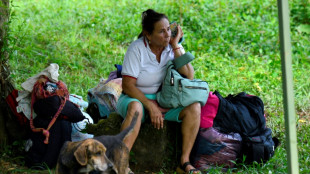

China slams Norway state fund over Xinjiang forced-labour fears
China on Wednesday blasted a decision by Norway's sovereign wealth fund to sell off its stake in a Chinese company due to rights concerns, warning the move may cause "unnecessary losses" to Oslo's interests.
The Norwegian central bank said Monday it would divest from sports brand Li-Ning "due to unacceptable risk that the company contributes to serious human rights violations", after its ethics council linked the company with forced labour in China's Xinjiang region.
Beijing stands accused of having detained more than a million Uyghur and other Turkic-speaking Muslims in political re-education camps across Xinjiang and exploiting them for forced labour.
Human rights groups say they have found evidence of torture and forced sterilisation in the region, and countries including the United States, France and Canada have labelled the situation a "genocide".
Chinese foreign ministry spokesman Zhao Lijian on Wednesday called the accusations a "huge lie concocted by anti-China forces".
He urged "relevant parties ... not to be deceived by lies, so as to avoid unnecessary losses to their own interests".
Norway's sovereign wealth fund -- known as the oil fund -- is the largest in the world and was worth 12,340 billion Norwegian kroner ($1,381 billion) at the end of last year.
At the time, it held 0.59 percent of Li-Ning shares, valued at nearly 1.5 billion kroner -- but have since sold them.
The fund is governed by ethical rules that prohibit it from investing in companies involved in serious human rights violations, those that manufacture "particularly inhumane" or nuclear weapons as well as coal and tobacco products.
It dumped Li-Ning following a recommendation from its ethics council, which in an advisory opinion pointed to reports linking the company to "a supplier said to manufacture inside an internment camp", according to the central bank.
China and Norway clashed in 2020 when Beijing temporarily banned imports of Norwegian salmon, warning that the fish was a potential source of Covid-19.
M.Fierro--IM



